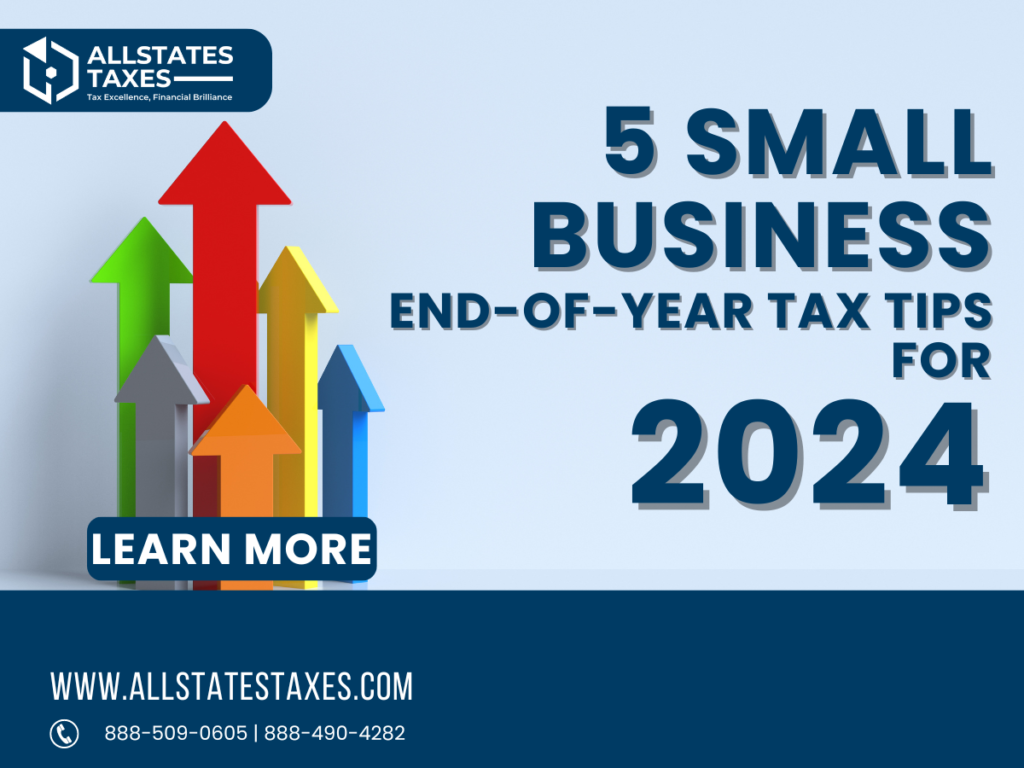As 2024 draws to a close, small business owners are turning their attention to the upcoming tax season. Preparing your taxes can be overwhelming, especially when you’re trying to maximize your small business tax deductions and reduce your overall tax liability. To help you navigate this process smoothly, here are five end-of-year tax tips specifically designed for small businesses. By following these strategies, you can ensure your business is tax-ready and positioned for success in the new year.
Maximize Small Business Tax Deductions
Small business tax deductions are essential tools for reducing your taxable income, and the end of the year is the perfect time to take full advantage of them. Deductions can include anything from office supplies and equipment purchases to travel expenses and employee benefits. By carefully reviewing your expenses and ensuring that you’ve accounted for all possible deductions, you can significantly lower your tax bill.
Start by categorizing your expenses properly. Common tax expense categories for small businesses include:
- Office Supplies and Equipment: Computers, printers, and office furniture.
- Employee Salaries and Benefits: Wages, health insurance, and retirement contributions.
- Rent and Utilities: Expenses related to your business premises.
- Professional Services: Legal, accounting, and consulting fees.
- Marketing and Advertising: Costs for promoting your business.
Each of these categories can contribute to substantial savings when properly documented. Keep detailed records of all your business expenses throughout the year, and work with a tax professional to identify any deductions you might have missed. If you’re unsure about where to start, consider searching for small business tax preparation near me to find local experts who can help.
Consider Timing for Purchases and Expenses
The timing of your purchases and expenses can have a significant impact on your tax bill. One common strategy is to accelerate expenses or delay income to optimize your tax situation. For example, if you anticipate being in a higher tax bracket next year, it may be beneficial to defer income until after the new year while accelerating deductible expenses into the current year.
Purchasing necessary equipment or paying for services before the year ends allows you to deduct those expenses on this year’s taxes, reducing your taxable income. Additionally, if you’re considering giving bonuses to employees, doing so before the year’s end can also be advantageous for your tax return.
However, timing strategies require careful consideration and planning. It’s important to understand the potential implications of these decisions and to consult with a tax professional to ensure they align with your overall tax strategy. If you need assistance, a small business tax filing expert can guide you through the process.
Review Your Estimated Tax Payments
If your small business pays estimated taxes throughout the year, the end of the year is an excellent time to review these payments. Estimated tax payments are typically required for businesses that expect to owe $1,000 or more in taxes for the year. These payments are made quarterly to the IRS and can help you avoid underpayment penalties.
As the year comes to a close, compare your actual income and expenses to the estimates you used to calculate your quarterly payments. If you’ve earned more than expected, you may need to make an additional payment to avoid penalties. Conversely, if your income was lower than anticipated, you might have overpaid and could be eligible for a refund or a reduced payment in the final quarter.
Small business taxes for beginners can be complex, and keeping up with estimated payments is crucial for staying on track. If you find yourself struggling with this aspect of your tax preparation, seeking professional advice is a wise choice.
Understand Your Depreciation Options
Depreciation is a valuable tax tool for small businesses that own assets like vehicles, machinery, or real estate. Depreciation allows you to deduct the cost of these assets over their useful life, rather than expensing them all at once. The IRS provides several methods for calculating depreciation, and choosing the right one can have a significant impact on your tax bill.
The most common methods include:
- Straight-Line Depreciation: Spreads the cost evenly over the asset’s useful life.
- Accelerated Depreciation: Allows for larger deductions in the earlier years of the asset’s life.
- Section 179 Deduction: Permits businesses to deduct the full cost of certain assets in the year they are purchased, up to a specified limit.
Understanding how to leverage depreciation can lead to substantial tax savings. If you have purchased assets during the year, consult with a tax professional to determine the best depreciation method for your situation. For those unfamiliar with the intricacies of depreciation, searching for small business tax preparation near me can connect you with local experts who specialize in this area.
Prepare for Potential Tax Law Changes
Tax laws are constantly evolving, and staying informed about potential changes is essential for effective tax planning. As 2024 ends, be on the lookout for any new legislation that could impact your small business tax strategy. This might include changes to tax rates, deductions, or credits that could either benefit or disadvantage your business.
To prepare for these changes, consider:
- Monitoring Tax News: Keep an eye on reliable tax news sources for updates on new legislation.
- Consulting with a Tax Professional: Regular meetings with a tax advisor can help you stay ahead of any changes and adjust your strategy accordingly.
- Planning for Uncertainty: Build flexibility into your tax planning so you can quickly adapt to new laws or unexpected financial developments.
If you’re asking yourself, do you need a tax ID for a small business or other tax-related questions, make sure you’re also considering how new regulations might affect your requirements.
Small Business Tax Deductions: A Crucial Aspect of Tax Planning
When it comes to reducing your tax liability, maximizing your small business tax deductions is one of the most effective strategies. Deducting legitimate business expenses reduces your taxable income, which in turn lowers the amount of tax you owe. Understanding which deductions are available and how to claim them can save your business thousands of dollars each year.
Whether you’re deducting office supplies, travel expenses, or the cost of hiring employees, keeping accurate records is vital. Misreporting or failing to claim deductions you’re entitled to can result in higher taxes or even penalties. Therefore, meticulous record-keeping and a thorough understanding of tax deduction rules are essential for every small business owner.
FAQs
What are the most common small business tax deductions?
Common deductions include office supplies, employee salaries, rent, utilities, marketing, travel expenses, and professional services like accounting or legal fees.
How can I find a reliable tax professional for my small business tax deductions?
You can search for small business tax preparation near me to find local experts who specialize in small business taxes. Checking reviews and asking for referrals from other business owners can also help you find a trustworthy professional.
Do I need a tax ID for my small business tax deductions?
Most businesses need an Employer Identification Number (EIN), which serves as a tax ID. However, some sole proprietors may use their Social Security Number instead. It’s best to consult with a tax professional to determine your specific needs.
What should I consider when timing my business expenses?
Consider your current and projected income, potential tax bracket changes, and cash flow needs. Accelerating expenses or deferring income can be beneficial, but it’s important to weigh the pros and cons.
How does depreciation affect my small business taxes?
Depreciation allows you to deduct the cost of assets over time, reducing your taxable income. The method you choose for depreciation can significantly impact your tax liability, so it’s crucial to understand your options.
Are there any new tax laws affecting small businesses tax deductions in 2024?
Tax laws change frequently, and it’s important to stay informed. Consult with a tax professional to understand any new legislation that might impact your small business taxes in 2024.
Conclusion
As 2024 comes to a close, now is the time to take proactive steps to optimize your small business tax deductions and overall tax strategy. By focusing on maximizing deductions, timing your expenses wisely, reviewing estimated payments, understanding depreciation, and staying informed about potential tax law changes, you can significantly reduce your tax burden and set your business up for financial success in the coming year.
Remember, navigating the complexities of small business taxes doesn’t have to be done alone. Consider seeking professional guidance to ensure you’re making the most of every available deduction and preparing for any changes in tax laws. With careful planning and attention to detail, your small business can thrive in 2024 and beyond.



